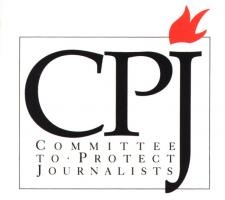
On a rainy Saturday afternoon, Journalist and Investigative Reporter Lisa Ling twittered: "About to lose my f'ng mind!"
Not the kind of words you'd expect from a multi award-winning journalist who's covered gang rape in the Congo to bride burning in India. Ling reported from more than two dozen countries, including Afghanistan, Iraq, and Iran.
It takes a lot for Ling to lose her cool.
But her current situation is far from the objective, professional world. She's fighting for her sister Laura's life.
Laura Ling, also a journalist, was on assignment and was arrested In North Korea. She was summarily tried and convicted. Laura Ling and reporter Euna Lee who both work for Vice-President Al Gore's Current TV, were convicted by the communist nation's Central Court of an undefined "grave crime" against the regime and sentenced to 12 years of hard labor.
The surprising thing is that - as terrible a situation as this is - it is better than the fate that befalls a startling number of Journalists who are taken prisoner, or executed around the world. The detention, conviction, and murder of journalists has reached almost epidemic proportions -- and rarely makes the front page.
This is hardly new. In 2003, I directed a feature-length documentary titled: "Journalists: Killed In The Line of Duty." Back then, we reported that more than 20 Journalists had been killed in that past year. The film told the story of the kidnapping and murder of Wall Street Journal reporter Daniel Pearl in January 2002. It concludes with the deaths of two journalists in April 2003: NBC correspondent David Bloom, who died of a blood clot while covering the war in Iraq, and Ukrainian reporter Taras Protsyuk (Reuters) who was killed when a tank shelled his Baghdad hotel.
At the time, I said: "Around the world, the practice of Journalism - of a free press - is thought of as one of great products of Democracy." We worked with the The Committee To Protect Journalists to gather the facts - and brought a remarkable team of Journalists together to insure that the film carried the weight and importance that subject deserved. Anderson Cooper was the host. Dan Rather, Tom Brokaw, Walter Cronkite, Peter Jennings, and Christiane Amanpour provided the film's journalistic voice.
CPJ maintains a comprehensive database of journalists killed in the line of duty - here http://www.cpj.org/deadly/
And so, I went back to the CPJ database to see how thing had changed since our film reported the 2002 results of 20 deaths. The numbers are sobering.
Journalists Killed in the line of duty:
2003: 42 Confirmed
2004: 60 confirmed
2005: 48 Confirmed
2006: 56 Confirmed
2007: 66 Confirmed
2008: 41 Confirmed
What I learned in 2003 is perhaps even more operative today. Journalists are powerful targets in troubled times. Killing a journalist sends a chill through anyone who might be thinking of speaking out, it silences a potential truth teller, and it sends an unmistakable message to other working journalists. But perhaps most troubling, given the scope of the problem and the depth of the data and information - journalists don't like reporting on their own colleagues. It seems too self-serving and somehow crosses the line from objectivity to subjectivity. That's why CPJ has such a difficult time getting their stories reported in US media.
Which is why I think Laura Ling is perhaps in a better situation than many journalists in danger around the world. She is in prison, and she's clearly considered a pawn in a larger diplomatic battle between the US and North Korea. She has powerful advocates in her sister, her colleagues, and of course Vice-President Al Gore. And she's got the attention of the current administration. I don't mean to in any way diminish the danger, or the fear and pain being faced by her family and friends. Just the other night I tuned in to Current and found myself watching Laura Ling's report on street violence and the drug trade in Mexico. She's a fearless reporter, and a gifted video journalist. The fact that she's in the spotlight and that she's got the attention of powerful diplomatic channels doesn't mean that her release is a forgone conclusion. Far from it.
But she's head and shoulders better off than the hundreds of murdered Journalists who's names remain essentially unknown and unreported.
In 2009, the CPJ published the report: "Getting Away With Murder" pointing a bright light on countries where journalists are slain and killers go free. "We're distressed to see justice worsen in places such as Sri Lanka and Pakistan" said Joel Simon, CPJ executive director. Their findings indicated that the failure to solve journalist murders perpetuates further violence against the press. Said Simon: "Worldwide, the vast majority of victims are local reporters covering sensitive topics such as crime, corruption, and national security in their home countries."
So it's critically important that we focus on Laura Ling and Euna Lee. With Vice-President Gore involved, it's clear that diplomacy is being conducted at the highest level. But once they're released from prison - and that is the only acceptable outcome - then the plight of Journalists around the world need to remain front and center. Because for every case that captures the attention of politicians and the media, hundreds of others remain in the shadows. Thanks the CPJ, the data is there. Now we need action.
